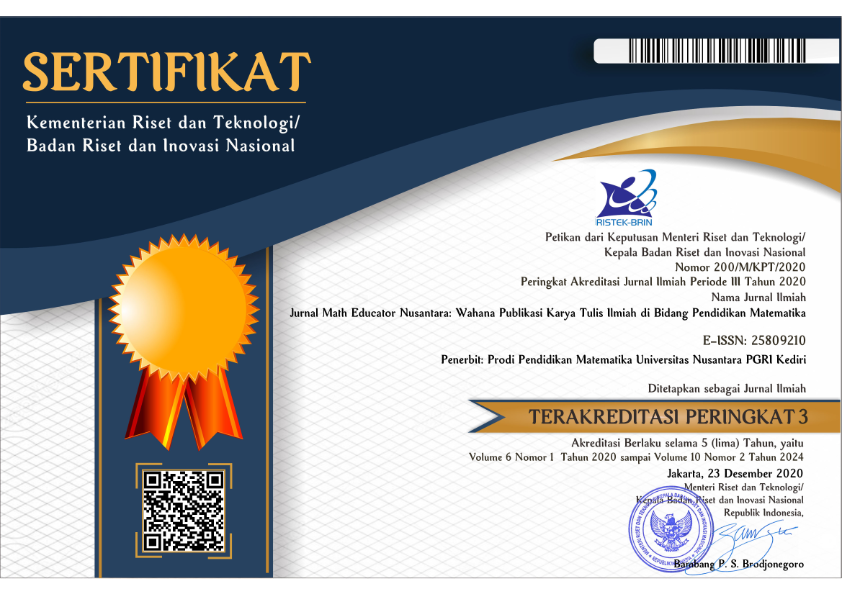Implementation of problem-based learning models to improve understanding of mathematics concepts at Al-Hassan high school
DOI:
https://doi.org/10.29407/jmen.v9i1.19544Keywords:
Problem Based Learning Learning Model, Understanding of Mathematical ConceptsAbstract
The purpose of this study was to find out the application of the Problem Based Learning learning model in increasing students' understanding of mathematical concepts in learning Mathematics on the material of a two-variable linear equation system in class X IPA SMA AL-HASSAN BALIKPAPAN. The implementation of this research was through a cyclical review process consisting of four stages, namely planning, action, observation, and reflection. Procedure This research was carried out in two cycles, namely the first cycle and the second cycle. Each cycle consists of 4 meetings. In this study, the subjects in this study were students of class X with a total of 20 students consisting of 9 male students and 11 female students. Data collection in this study was carried out by tests, documentation and observation. Data analysis was carried out by classifying student data, presenting data, interpreting data, and concluding. Based on the results of the study, several conclusions can be drawn to answer the question that the PBL learning model can improve students' mathematical concept comprehension tests in Class X IPA SMA AL-Hassan Balikpapan. This is based on the results of the test for understanding the mathematical concept of the two-variable system of equations (SPLDV) material for students in cycle I who achieved scores above 65 in PBM only achieving a score of 90%, the results obtained from tests of students' understanding of mathematical concepts in PBM increased from the first cycle with a score above 65 reaches 100%.
References
Belajar Siswa dalam Pembelajaran Matematika melalui Implementasi Model Pembelajaran Problem Based Learning (PBL). PRISMA, 9 (2), 213-220. DOI: https://doi.org/10.35194/jp.v9i2.1008
Arends, R. I. (2011). Learning to Teach, (terjemahan). Yogyakarta: Pustaka Pelajar.
Arifin, Z. (2009). Evaluasi Pembelajaran. Bandung: PT. Remaja Rosdakarya
Barell, John. (2007) Problem Based Learning second edition. California: Corwin Press a Sage Publications Company.
Fauzia, H. A. (2018). Penerapan model pembelajaran problem based learning untuk meningkatkan hasil belajar matematika SD. Primary: Jurnal Pendidikan Guru Sekolah Dasar, 7(1), 40-47. DOI: http://dx.doi.org/10.33578/jpfkip.v7i1.5338
Febriyanto, B., Haryanti, Y. D., & Komalasari, O. (2018). Jurnal Cakrawala Pendas. Peningkatan Pemahaman Konsep Matematis Melalui Penggunaan Media Kantong Bergambar pada Materi Perkalian Bilangan di Kelas II Sekolah Dasar, 4 (2), 32-44. DOI: http://dx.doi.org/10.31949/jcp.v4i2.1073
Hasanah, U., Sarjono, S., & Hariyadi, A. (2021). Pengaruh Model Problem Based Learning Terhadap Prestasi Belajar IPS SMP Taruna Kedung Adem. Aksara: Jurnal Ilmu Pendidikan Nonformal, 7(1), 43-52. DOI: http://dx.doi.org/10.37905/aksara.7.1.43-52.2021
Kamarianto, K., Noviana, E., & Alpusari, M. (2018). Penerapan Model Pembelajaran Problem Based Learning untuk Meningkatkan Hasil Belajar IPS Siswa Kelas IV Sd Negri 001 Kecamatan Sinaboi. Jurnal Online Mahasiswa (JOM) Bidang Keguruan dan Ilmu Pendidikan, 5(1), 1-12. https://jom.unri.ac.id/index.php/JOMFKIP/article/view/17680
Kemendikbud. 2014. Konsep Pendekatan Scientific. Kemendikbud. Jakarta.
Kurniasih, Imas & Berlin S. 2014. RPP. Kata Pena: Yogyakarta.
Mente, H., & Jazuli, L. O. (2014). Pengaruh Model Pembelajaran Problem Based Learning Terhadap Hasil Belajar Matematika Siswa Kelas X SMA Negeri 9 Kendari. Jurnal Penelitian Pendidikan Matematika, 2 (2), 37-54. DOI: http://dx.doi.org/10.36709/jppm.v2i2.3093
Purwanto. (2008). Metodologi Penelitian Kuantitatif. Yogyakarta: Pustaka Belajar.
Ramlawati, Yunus, S. R., & Insani, A. (2017). Pengaruh Model PBL (Problem Based Learning) terhadap Motivasi dan Hasil Belajar IPA Peserta Didik. Jurnal Sainsmat, 6 (1), 1-14. DOI: https://doi.org/10.35580/sainsmat6164512017
Sukmawati, R. (2021). Penerapan Model Pembelajaran Problem Based Learning untuk Meningkatkan Hasil Belajar Matematika Kelas II SDN Wonorejo 01. Glosains: Jurnal Sains Global Indonesia, 2(2), 49-59. https://glosains.greenpublisher.id/index.php/Glosains/article/view/21
Widana, I. W., & Diartiani, P. A. (2021). Model pembelajaran problem based learning berbasis etnomatematika untuk meningkatkan aktivitas dan hasil belajar matematika. Emasains: Jurnal Edukasi Matematika Dan Sains, 10(1), 88-98. DOI: https://doi.org/10.5281/zenodo.4657740
Yamin, Martinis. 2013. Strategi & Metode dalam Model Pembelajaran. GP Press Group: Jakarta.
Downloads
Published
Issue
Section
License
Authors who publish with this journal agree to the following terms:
- Copyright on any article is retained by the author(s).
- The author grants the journal, the right of first publication with the work simultaneously licensed under a Creative Commons Attribution License that allows others to share the work with an acknowledgment of the work’s authorship and initial publication in this journal.
- Authors are able to enter into separate, additional contractual arrangements for the non-exclusive distribution of the journal’s published version of the work (e.g., post it to an institutional repository or publish it in a book), with an acknowledgment of its initial publication in this journal.
- Authors are permitted and encouraged to post their work online (e.g., in institutional repositories or on their website) prior to and during the submission process, as it can lead to productive exchanges, as well as earlier and greater citation of published work.
- The article and any associated published material is distributed under the Creative Commons Attribution-ShareAlike 4.0 International License















